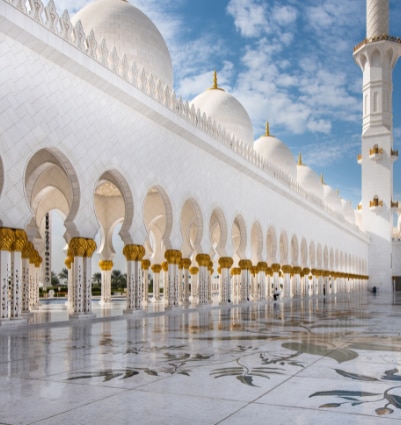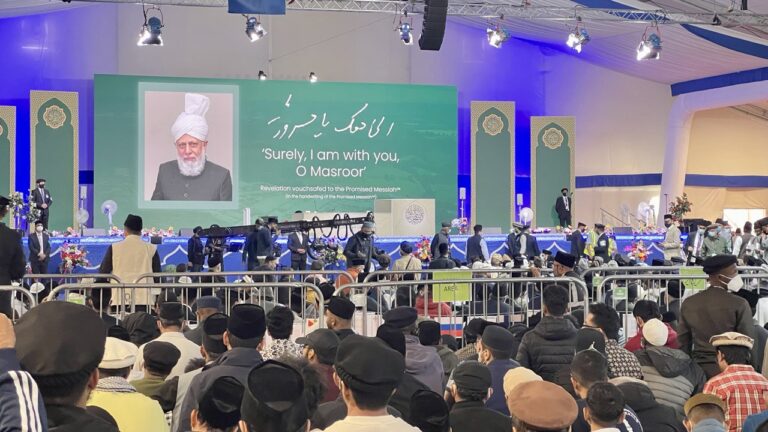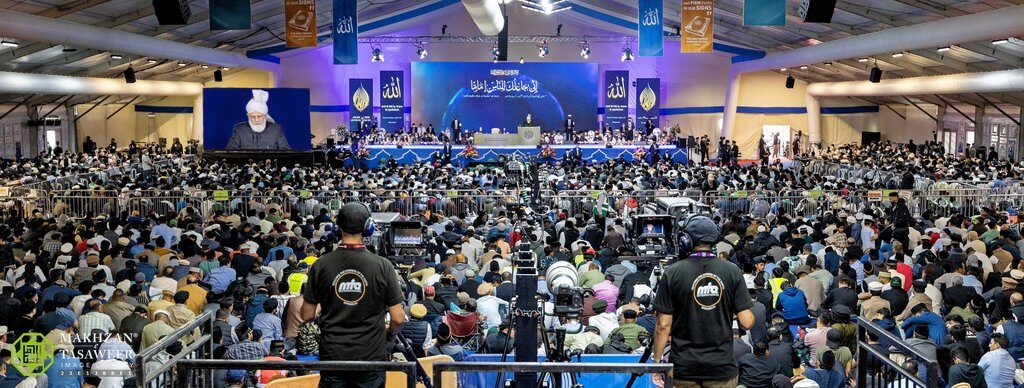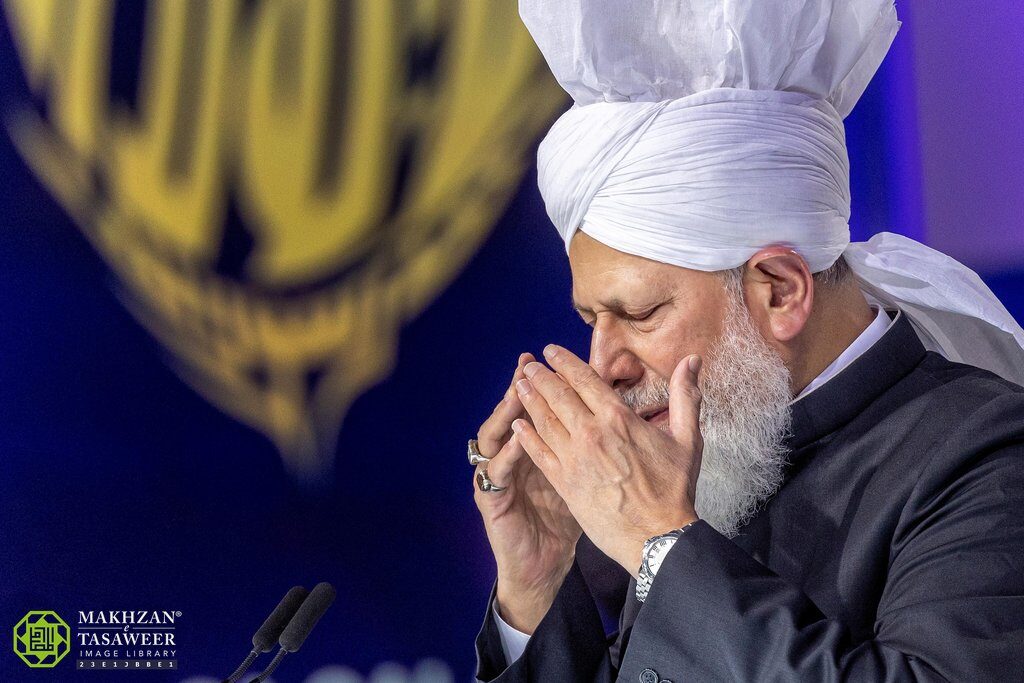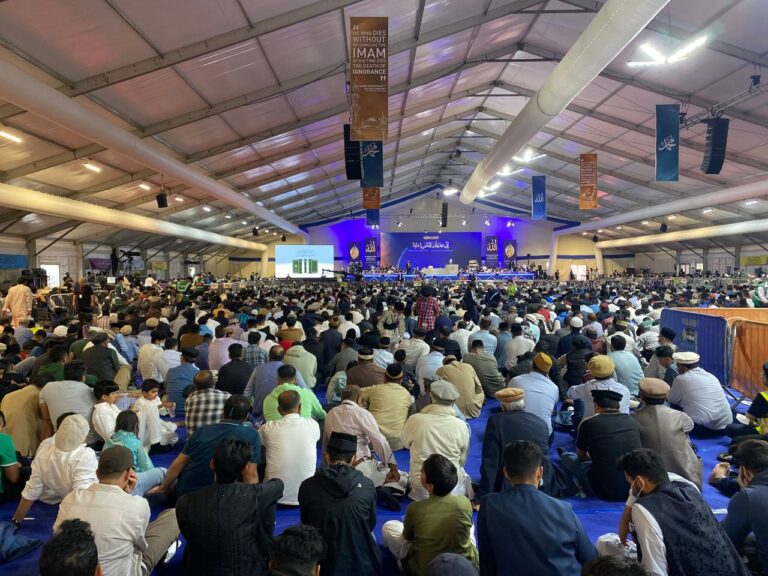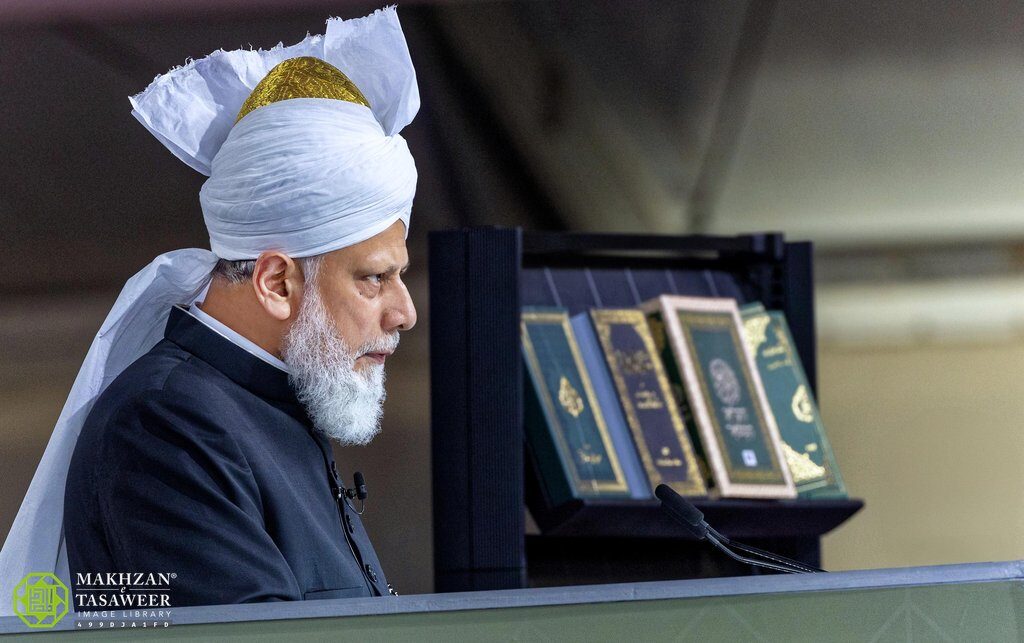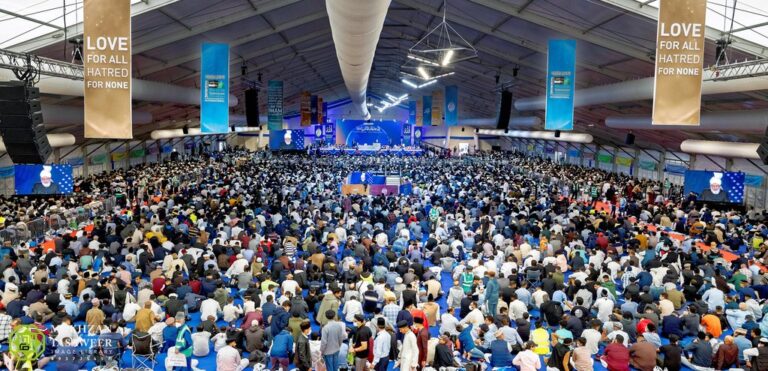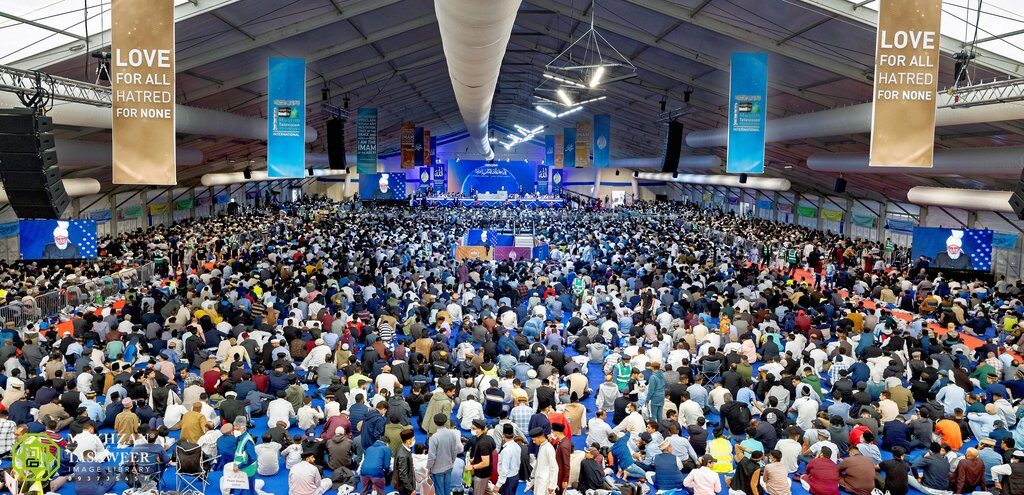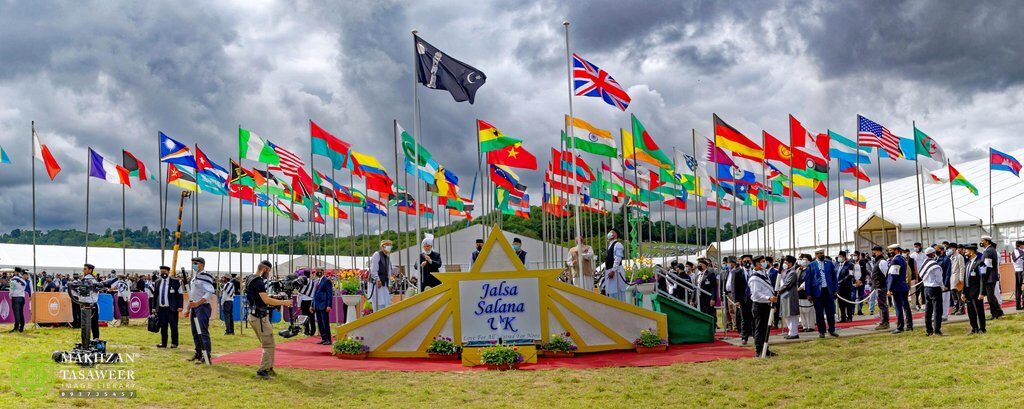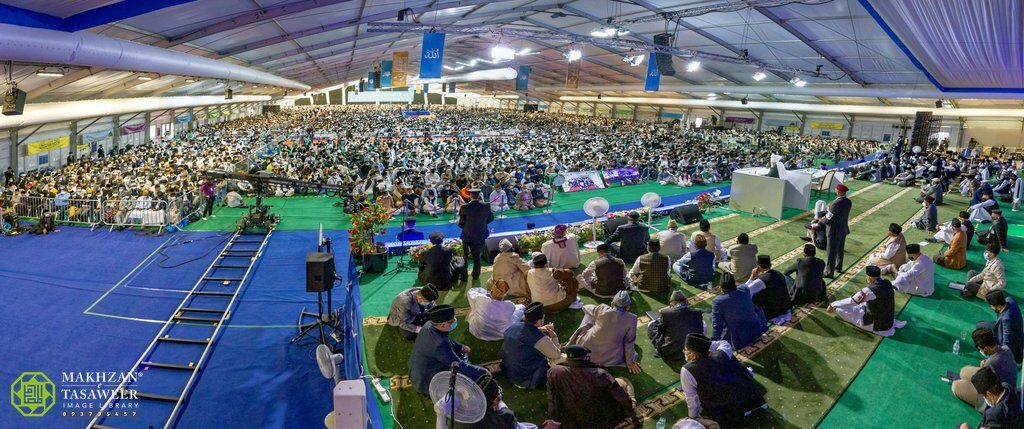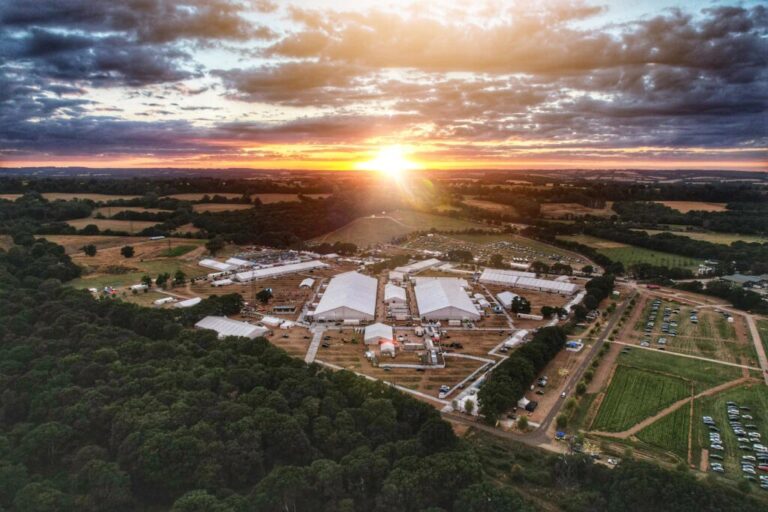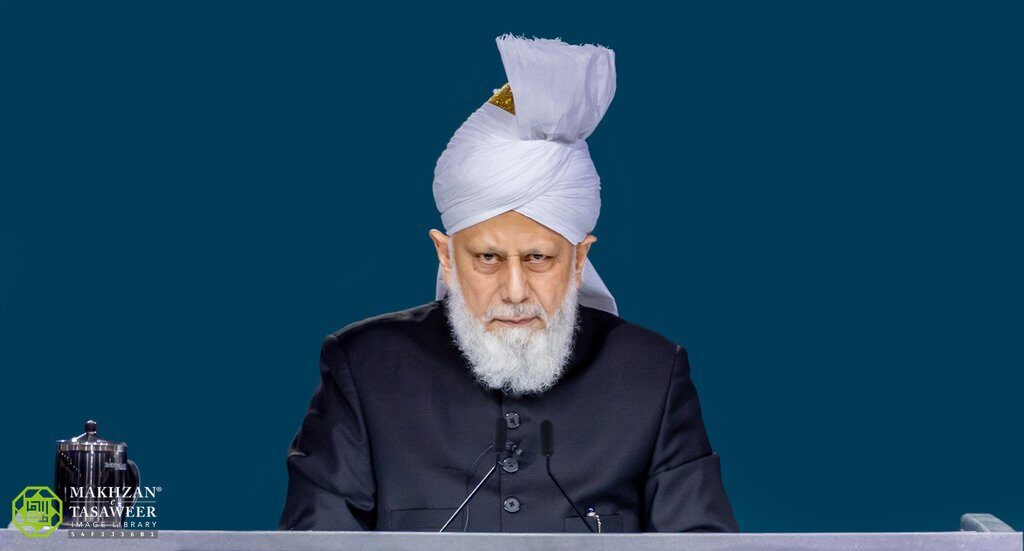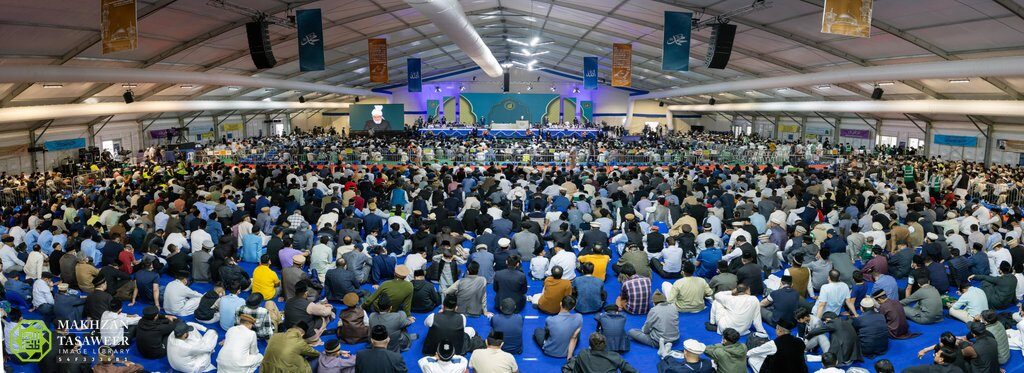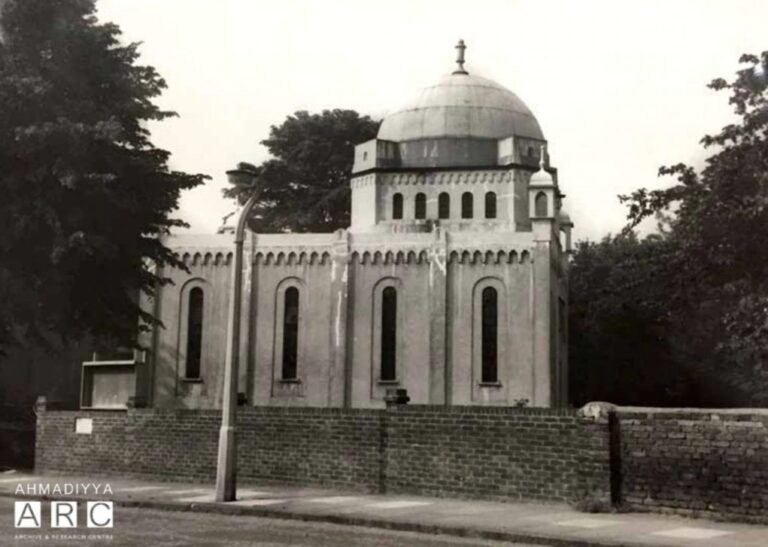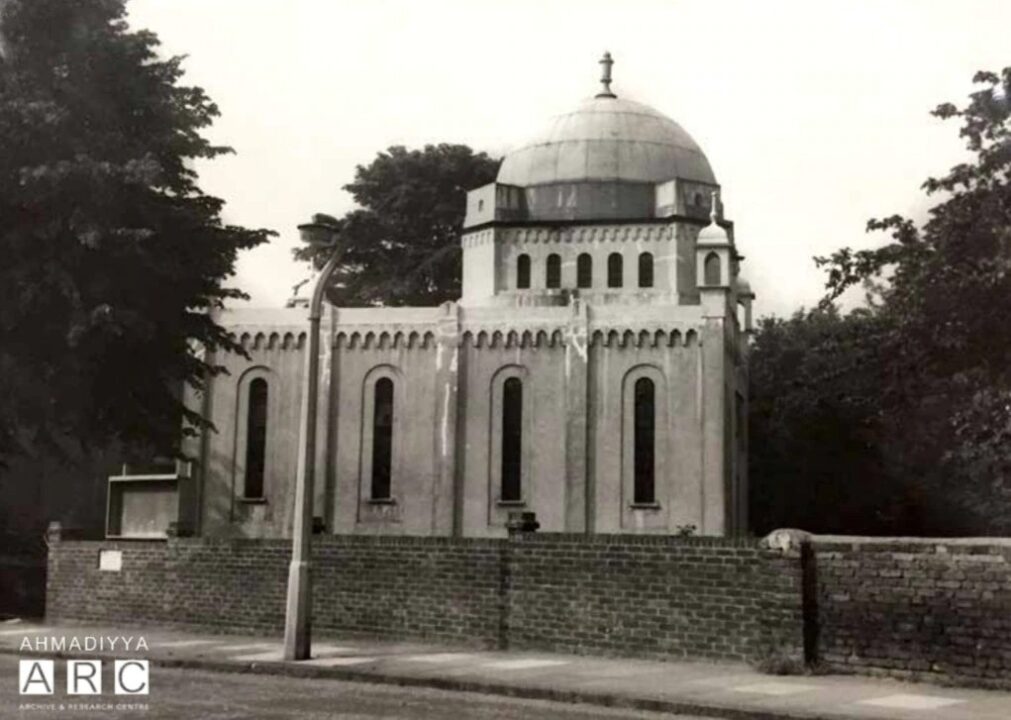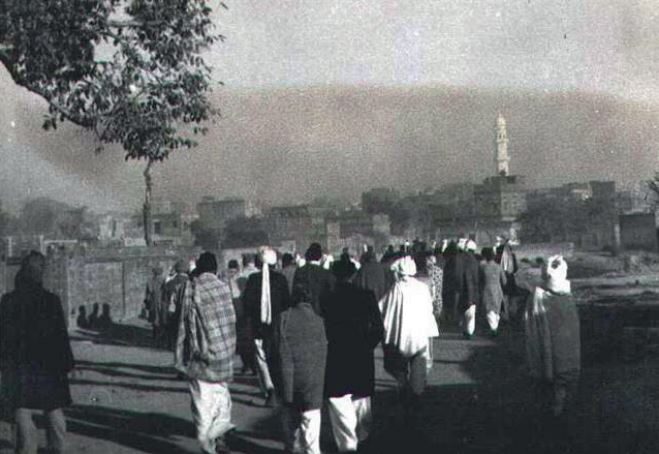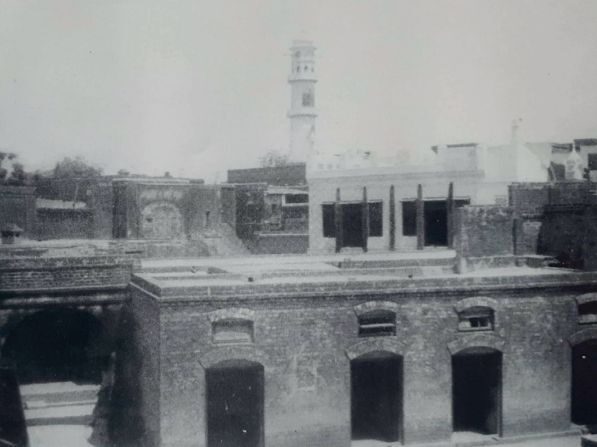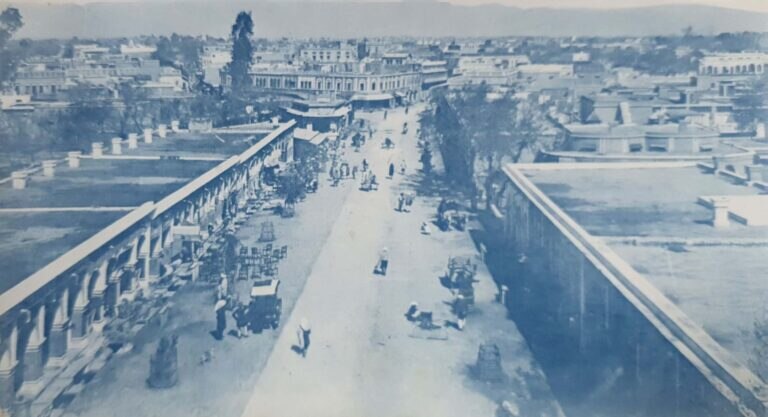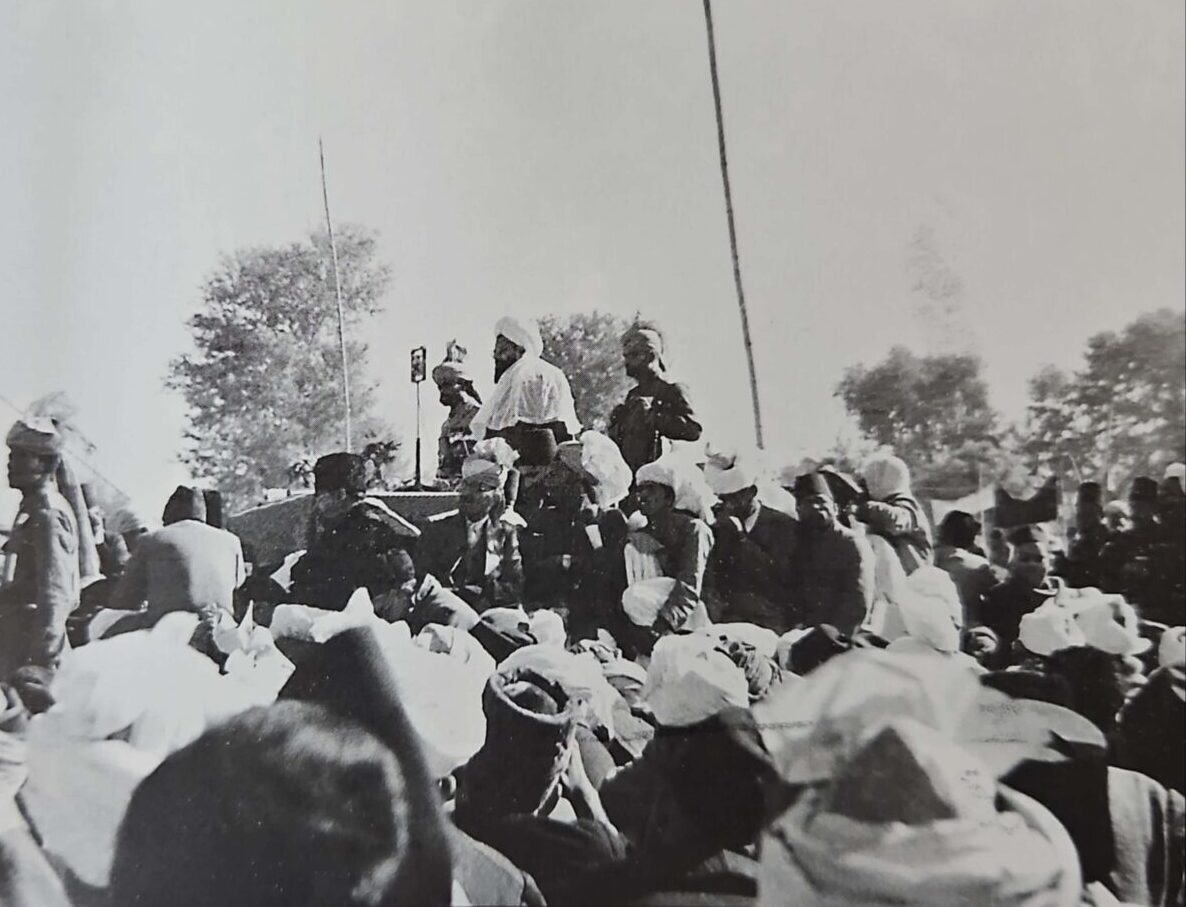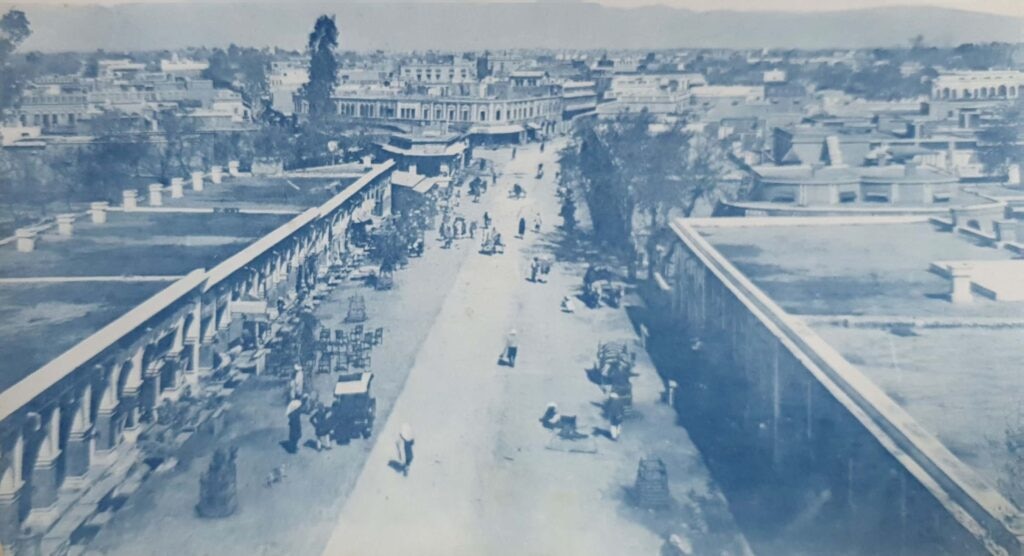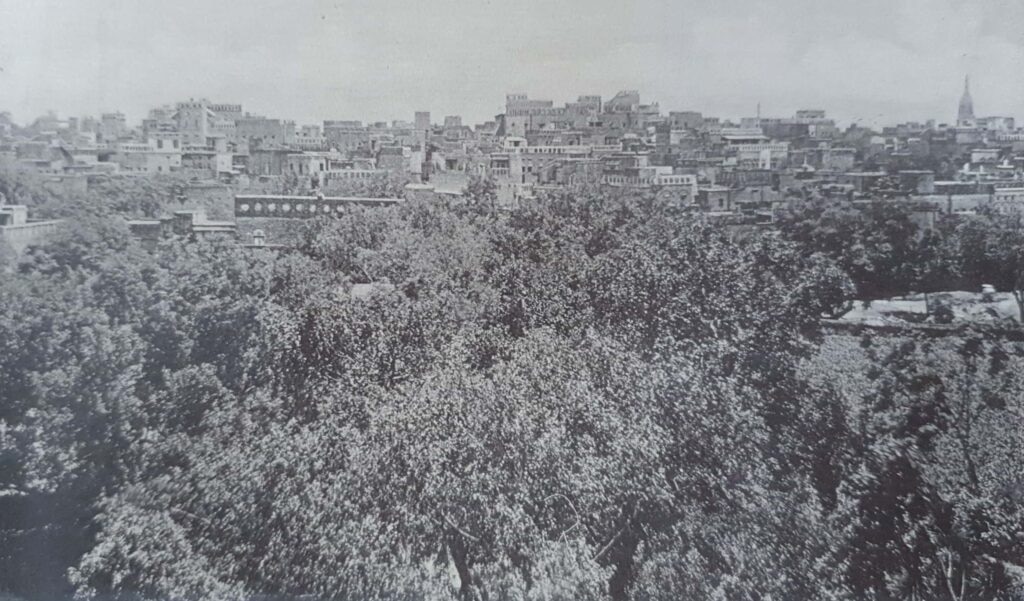Hadeeqatul Mahdi, 30 July 2023: At around 4:10pm Hazrat Mirza Masroor Ahmad, Khalifatul Masih Vaa graced the jalsa gah for Jalsa Salana UK 2023’s concluding session.
The session commenced with Hafiz Ismael Ahmad Sahib reciting verses from Surah al-Baqarah (178, 196), Surah an-Nisa’ (136), Surah al-An‘am (153), and Surah an-Nahl (91-92) of the Holy Quran. He then presented their Urdu translation from Tafsir-e-Saghir. Following this, a group from Kababir Jamaat presented an Arabic qaseedah, composed by the Promised Messiahas in his work Minan-ur-Rahman, with its Urdu translation presented by Tahir Nadeem Sahib of the Arabic Desk. An Urdu poem was then recited by Rana Mahoood-ul-Hasan Sahib. Then, Secretary Ta’lim UK was called to read out the names of Ahmadi students who had achieved academic excellence over the year. Rafiq Ahmad Hayat Sahib, Amir Jamaat UK, introduced the recipient of the 2023 Ahmadiyya Muslim Prize for the Advancement of Peace: Mr David Spurdle. Next, Joel Turenne, Advocate and Director, Judiciary Affairs at the Religious Ministry in Haiti, presented a plaque to Huzooraa.
A special message from King Charles to the attendees of Jalsa Salana UK 2023 was then read out by Amir Sahib UK.
Hazrat Amirul Momineenaa then came to the podium to deliver the concluding address of Jalsa Salana UK 2023, a summary of which is as follows:
After tashahud, ta‘awuz and Surah al-Fatihah, Huzooraa said that Islam is a religion that lays out in great detail the rights of everyone in society. The explanation of this is found in the Holy Quran and ahadith, and in this age, the Promised Messiahas further explained these rights. Huzooraa said that he had spoken about these rights in previous Jalsas and that the details are so numerous that he has not been able to cover them completely. Nevertheless, Huzooraa said he would outline further rights in his address today.
Huzooraa said that Islam’s teachings are so beautiful that if followed, they can bring the solution to all the problems in the world. Huzooraa said that in 2022, he laid out some of the rights that Islam gave to women. After this, he received many letters, including those from non-Muslims, expressing their astonishment upon learning of these facts and the extent of rights Islam grants to women. Huzooraa said all Ahmadis should present Islam’s teaching in front of non-Muslims without hesitation or insecurity. Islam’s teachings are for all ages and do not change with each era. Worldly governments establish laws, however, with the passage of time, people realise those laws are not perfect and have many flaws. Thus they begin to raise their voices against those laws. This is not the case with the laws of Islam.
Huzooraa said these rights can only be truly established when mankind realises that there is a Higher Power Who is watching over every act of ours and that we are answerable to Him. The rights of Islam can only be established when humanity also believes in Allah and that if they opposed him, then they could be punished.
Huzooraa made it clear that we are not only to fulfil the rights of Allah, but those of His creation as well because Allah greatly loves His creation; by doing so, our faith will increase. True believers toil to attain this rank of faith, and a believer should exert all efforts to fulfil these rights.
Huzooraa said that to date, he had detailed the rights of 21 sections of society for which Islam establishes many rights. Huzooraa said he will highlight the rights Islam gives to the poor and needy. Huzooraa read the following verse of the Holy Quran in this regard:
“The alms are only for the poor and the needy, and for those employed in connection therewith, and for those whose hearts are to be reconciled, and for the [freeing of slaves], and for those in debt, and for the cause of Allah, and for the wayfarer — an ordinance from Allah. And Allah is All-Knowing, Wise.” (Surah at-Tawbah, Ch. 9, V.60)
In this verse, Allah has spoken about all those who are in need within society. The verse makes it clear that it is the government’s duty to ensure the needs of these people are met, without them asking; even prisoners should be spent on. Huzooraa said that the Jamaat was paying attention to this matter and was helping prisoners, who, in turn, are beginning to turn towards Islam Ahmadiyyat.
Another verse read out by Huzooraa was:
“[These spoils are] for the poor Refugees who have been driven out from their homes and their possessions while seeking grace from Allah and [His] pleasure, and helping Allah and His Messenger. These it is who are true [in their faith].” (Surah al-Hashr, Ch. 59: V.9)
Huzooraa narrated some incidents from the time of the Holy Prophetsa, to show how he laid out and established the rights of the needy and destitute.
Hazrat Saad bin Abi Waqasra once thought that he had a higher status than some other Companions. However, the Holy Prophetsa reminded him that the poorer Companions actually did the work of the rich and benefited them, so they should pay these poorer Companions accordingly. Huzooraa said that even in today’s world, many professionals strike with the complaint that they are not being paid enough. Huzooraa said all of these issues arise because the rights of the poor and needy are not being met.
Hazrat Abdullah bin Umarra narrated that Hazrat Umarra once received some land and informed the Prophetsa of this. The Prophetsa said that if he wanted, he could give that land to charity, which he did and donated to the needy.
Hazrat Abu Hurairahra narrated that the Holy Prophetsa said that the one who toils to help the needy and the widow is like the one who partakes in Jihad in Allah’s way.
Hazrat Abu Hurairahra also narrated that the needy was not he who asked for a morsel or two of food; rather, the needy was the one who did not ask people, and neither did people realise that he was in need. Huzooraa said the government should pay attention to this teaching and should themselves strive to find those in need and assist them. This is the right emphasised by Islam.
Hazrat Abu Hurairahra narrated that the worst of meals is that meal to which the rich are invited and the poor are neglected. Huzooraa said all Ahmadis should ensure that they invite the poor to their meals and events too. It was due to this teaching of the Prophetsa that the companions would always try to alleviate the pain and suffering of those in need. Hazrat Jabirra would particularly sit with the poor and needy, and, as a result, the Prophetsa would call him Abu al-Maskeen, father of the poor, out of love.
It was narrated from Hazrat Mu’adh bin Jabalra that Allah’s Messengersa said: “Shall I not tell you about the kings of Paradise?’ He said: “Yes.” The Messengersa said: “A weak and oppressed man who wears tattered clothes and is not paid any heed. If he swears (an oath) by Allah, Allah fulfils it.’”
The Holy Prophetsa would not let any chance pass in which he could stress the importance of taking care of the poor.
Once, a man passed by the Holy Prophetsa, to which the Prophetsa asked (his companions), “What do you say about this (man)?” They replied, “[He is so honourable that] if he asks for a lady’s hand in marriage, he ought to be given her in marriage; and if he intercedes (for someone), his intercessor should be accepted; and if he speaks, he should be listened to.” Allah’s Messengersa kept silent, and then a man from among the poor Muslims passed by, and again, the Prophetsa asked (them), “What do you say about this man?” They replied, “If he asks for a lady’s hand in marriage, he does not deserve to be married; and if he intercedes (for someone), his intercession should not be accepted; And if he speaks, he should not be listened to.” The Holy Prophetsa said, “Surely, this poor man is better than so many of the first.” He told them that the man they thought was poor was much better than thousands of the richer ones.
It was narrated from Hazrat Salman bin Amirra that the Prophetsa said: “Giving charity to a poor person is charity, and (giving) to a relative is two things: charity and upholding the ties of kinship.”
It was narrated from Hazrat Abu Umamah bin Sahl bin Hunaifra that a poor woman once fell sick, and the Holy Prophet was informed of her sickness. The Holy Prophetsa used to visit the poor when they were sick and ask about them. The Prophetsa said: “If she dies, then inform me.” She passed away, and her funeral took place at night in the absence of the Holy Prophetsa as they did not like to wake him up. When morning came, he was told what had happened to her. He said: “Did I not tell you to inform me?” They said: “O Messengersa of Allah, we did not like to wake you up at night.” The Holy Prophetsa went out to her grave, the people lined up beside it and he said four takbirat.
It has been reported by Hazrat Abu Hurairara, that the Holy Prophetsa said:
“‘Who amongst you is fasting today?’ Hazrat Abu Bakrra said: ‘I am’. He (again) said: ‘Who amongst you followed a funeral procession today?’ Hazrat Abu Bakrra said: ‘I did’. The Holy Prophetsa again said: ‘Who amongst you served food to the needy?’ Hazrat Abu Bakrra said: ‘I did’. He (again) said: ‘Who amongst you has today visited the sick?’ Hazrat Abu Bakrra said: ‘I did’. Thereupon the Holy Prophetsa said: ‘Anyone in whom (these good deeds) are combined will certainly enter paradise.’”
Huzooraa said that the Prophetsa would take great care of the poor and needy, but at the same time teach them to stand on their own two feet and to avoid begging and asking. The Prophetsa would always say that the poor and needy were not those who would ask for a morsel or two of food, but rather those who would not ask, no matter how great the need. The Prophetsa would also teach them to earn their own wealth and thus establish themselves financially.
Hazrat Aishara narrates that a poor woman came to her house along with her two daughters to ask for some food. Hazrat Aishara said that there was nothing available in the house apart from a date, which she gave them. The lady split the date in half, gave a half each to her daughters, and then left. When the Prophetsa entered the house later, Hazrat Aishara told him about this incident. In response, the Prophetsa said that if a poor and needy person has daughters and then takes care of them, Allah will protect such a person from the punishment of hellfire. He also said that Allah would grant paradise to the woman who helped her daughters.
Hazrat Abu Salihra reported that Hazrat Umar bin al-Khattabra would help an old and blind woman who lived on the outskirts of Medina. At night, he would draw water for her and manage her affairs. When he came to her on one occasion, he found that someone else had preceded him and taken care of what she needed. So, Hazrat Umarra went to her the next day in advance, lest the other person came to her before him, and waited. He found that the person was Hazrat Abu Bakrra, the Khalifah of the time.
Hazrat Ibn Umarra narrated:
“In the lifetime of the Holy Prophetsa, Hazrat Umarra gave some of his property in charity, which was a garden of date palms called Thamgh. Hazrat Umarra said, ‘O Allah’s Messengersa! I have some property which I prize highly and I want to give it to charity.’ The Prophetsa said, ‘Give it in charity with its land, on the condition that the land and trees will neither be sold, given as a present nor bequeathed. Rather the fruits are to be spent in charity.’ So Hazrat Umarra gave it to charity. It was for Allah’s Cause, the emancipation of slaves, for the poor, for guests, for travellers and for kinsmen. The person acting as its administrator could eat from it reasonably and fairly and could let a friend of his eat from it, provided he had no intention of becoming wealthy by it.
Similarly, Hazrat Musleh-e-Maudra cites a well-known incident of Hazrat Umarra from which he concludes that though Hazrat Umarra had to endure hardships, he did not mind doing so and he established such equality which Islam seeks to establish throughout the world. The incident is as follows:
“Jabalah bin Ayham used to be a prominent chief of a Christian tribe. When Muslims began conquering Syria, he along with his tribe accepted Islam, and then proceeded to go for Hajj. During Hajj, at one point, there was a large crowd; incidentally, another Muslim stepped on his foot.
“In some narrations, it is stated that the Muslim stepped on the hem of his robe. [Jabalah] considered himself to be a king seeing as there were 60 thousand people who followed him. In fact, according to some historical accounts, 60 thousand was just the number of his soldiers.
“In any case, when a partially clothed Muslim man stepped on his foot, he was enraged and slapped him, saying ‘You wish to dishonour me. Do you not know who I am? You should have moved back out of respect, yet you have impudently stepped on my foot.’ After having been slapped, the Muslim man remained silent; however, another Muslim spoke up saying, ‘Are you aware of the fact that the religion which you have entered is Islam, and Islam does not distinguish between ordinary and prominent people. Especially in this house”, i.e. the Holy Ka‘bah around which he was performing circuits, “there is considered to be no difference between the rich and the poor.’ Jabalah replied, ‘I do not care about this.’
“The Muslim said, ‘If a complaint against you is made to Umarra, then he will surely take retribution from you for this Muslim.’ When Jabalah bin Ayham heard this, he became furious and said, ‘Is there anyone who would slap the face of Jabalah ibn Ayham?’ The Muslim man said, ‘I do not know about anyone else, but this is how Umarra would settle the matter.’
“Upon hearing this, [Jabalah] quickly completed circulating the Ka‘bah and then went straight to the gathering of Hazrat Umarra and asked, ‘If a prominent person slaps an ordinary man, then what do you do?’ Hazrat Umarra replied, ‘We will have the ordinary person slap the prominent person.’ Jabalah then said, ‘You have not understood what I mean to say. What I mean is that if there is an extremely prominent person who slaps [an ordinary person] then what do you do?’
“Hazrat Umarra said, ‘In Islam, there is no discrimination between the prominent and the ordinary.’ Then Hazrat Umarra said, ‘Jabalah, is it you who has committed this fault?’ Upon this, Jabalah lied and said that he had not slapped anyone and that he had simply asked a question. However, he left that gathering immediately and returned to his country with his people after which they became apostates and fought alongside the Byzantines in the battles against Muslims, however, Hazrat Umarra did not show any concern for him.” (Sair-e-Ruhani (Part 2), Anwar-ul-Ulum, Vol. 16, pp. 43-43)
This was the level of equality which was established by the Muslim government.
Once, Hazrat Umarra passed a door where an old man was sitting and begging. Hazrat Umarra asked him about his religion, to which he said he was a Jew. Hazrat Umarra asked him why he was begging, to which he replied that it was for the Jizya tax. He explained that he was of old age and no longer able to work. Hazrat Umarra took him with him and made sure he received provisions constantly. He said that when he was youthful, he worked and gave the Jizya, but it was not right that he was asked to give the jizya in his old age.
Historically, with regard to how the Islamic government granted rights, Hazrat Musleh-e-Maudra noted:
“When the Holy Prophetsa passed away and Muslims began to spread to different corners of the world, foreign nations also entered the fold of Islam. The Arabs were like one group of people and a single nation and would uphold equality amongst themselves, but when Islam spread to different regions and various nations began entering the fold of Islam, arrangements for food became very difficult. Ultimately, Hazrat Umarra conducted a census for all individuals and established a system for rationing which lasted until the reign of the Banu Umaiyyah.”
“European historians admit that the first census ever taken was by Hazrat Umarra. They also admit that this very first census taken by Hazrat Umarra was not to seize the wealth of its citizens but to establish a system for their sustenance. Other governments take a census to make sacrificial lambs out of their people and to procure military services; however, Hazrat Umarra did not take a census for this purpose but did so to provide them with food and to ascertain the number of people and how much food would be required. Therefore, after taking the census, all people would receive sustenance under a designated system and a monthly allowance would be given to fulfil other remaining necessities.”
Hazrat Musleh-e-Maudra also said:
“When the Islamic government obtained wealth, it created infrastructure for the food and clothing of every person. Hence, as mentioned earlier, “it was in the era of Hazrat Umarra when the system was complete, at which time, according to the teachings of Islam, the food and clothing of every person was the responsibility of the government, and it carried out this duty with great care. This was the reason for which Hazrat Umarra initiated the practice of taking a census and opened registries wherein everyone’s names would be entered.
“It is recorded in history that in his earlier decisions, Hazrat Umarra had not provided for the needs of suckling babies, and an infant’s due ration was granted only after it had been weaned by its mother […] one night, while out on a round of quiet inspection, Hazrat Umarra heard the wailing sound of an infant from a tent, which made him pause. But the cries continued, even though the mother tried to put the child to sleep by patting him.
“Eventually, Hazrat Umarra entered the tent and enquired of the mother, ‘Why do you not suckle the child? The child has been crying for quite some time’. The woman did not recognise Hazrat Umarra and thought he was an ordinary person. Hence, she answered, ‘Are you unaware that Hazrat Umarra has decreed that no ration be granted in the case of suckling infants? We are poor with hardly enough to make ends meet. I have weaned the child early so that we should get the child’s share of the ration from the treasury. If the child cries, then it is the fault of Umarra who created such a law.’ Hazrat Umarra returned at once and painfully addressed himself saying, ‘O Umarra, O Umarra, do you have any idea how you have weakened the coming generation of the Arabs by causing infants to be prematurely weaned; the responsibility for this lies with you.’ As he said this, he went to the storage, opened the door and lifted a sack of flour on his own back. When an attendant offered to carry it for him, he replied, ‘No. The fault is mine and I must bear the consequences for it myself.’ He then carried the flour to the woman and ordered the next day that a ration be granted for a child from the day it was born because the nursing mother would be in need of better nourishment as she feeds the child.” (Islam Ka Iqtasadi Nizam, Anwar-ul-Ulum, Vol. 18, pp. 61-62)
Hazrat Musleh-e-Maudra said:
“It is Islam alone that has established the rights of every person. According to Islam, every person’s sustenance, lodging and clothing is the responsibility of the government, and Islam was the very first to establish this principle.
“Now, other governments are also following suit, but not to the full extent. Insurance is still bought and family pensions are given out, but the principle of the government being responsible for the sustenance and clothing of young and old was not presented by any religion before Islam. Worldly governments take censuses in order to collect taxes or for the purposes of military conscription; so that if the need arises, they may know how many youths will be available to them.
“However, the very first census taken by Islam during the era of Hazrat Umarra was for the purpose of providing food and clothing, not in order to impose taxes or to find out how many youths could be available for the army when needed. That census was solely conducted so that every person could be provided food and clothing.
“There is no doubt that a census was also conducted during the time of the Holy Prophetsa, but at the time, the Muslims did not hold governance, thus the purpose of that census was only to determine the number of Muslims. The first census taken by an Islamic government was during the era of Hazrat Umarra, and was conducted so that every person could be provided food and clothing.
“This is a matter of vital importance, which can establish peace in the entire world. It is said that one ought to submit a request [for rations etc.] and it will be evaluated [by the government]; however, not everyone’s sense of honour will permit them to submit such a request that would then be evaluated. Thus, Islam established the principle that the responsibility of providing food and clothing lies upon the government which will be provided to the rich and poor alike; even if they are millionaires and even if they decide to pass it on to someone else. This is so that nobody is made to feel as if they are inferior.”
Huzooraa said many world governments today were following this way of Islam, however, today, it is unfortunate that Muslim states themselves (save a few) are not giving these rights Islam teaches to give. If they give these rights, the problems Muslim countries face will drastically change for the better.
Hazrat Khalifatul Masih Vaa quoted the Promised Messiahas who said:
“Virtue is a ladder that lifts one towards Islam and God. But remember, what is virtue? On every route, Satan raids the people and leads them away from the path of truth. For example, let us presume that one night more bread is cooked than necessary, and the following morning there is some leftover. Just before the first morsel, as one is about to begin their meal and many delicious foods are placed before them, a beggar comes to the door and calls out, asking for bread. If the person says: ‘Give the leftover bread to the beggar,’ would this be deemed a good deed? The leftover bread was going to remain unused anyway. Why would an indulgent person eat such bread?
“Allah the Exalted states: ‘And they feed, for love of Him, the poor, the orphan, and the prisoner.’ It should also be remembered that the Arabic word ta‘am used here refers to desirable food. Stale leftovers are not referred to as ta‘am. Therefore, if, at the sound of a beggar, the person were to give away their desirable and delicious food freshly placed on their plate just before they began to eat it, this is what constitutes a good deed.”
Many poor, destitute and needy women would knock on the door of the Promised Messsiahas and demand some medicine, etc. The Promised Messiahas would calmly give these poor people what they needed.
Hazrat Maulvi Abdul Karim Sialkotira Sahib narrated:
“On certain occasions, village ladies will come to ask for medicine, and they will knock on the door loudly and say in their simple, village tongue: “Mirza Ji! Open the door, will you.” The Promised Messiahas will stand up as one obeys the call of an honourable master and will speak to them and advise them with a cheerful face. In our country, even the educated classes give little value to the importance of time, so villagers are naturally all the more prone to waste time. Sometimes a lady will begin rambling about useless things, and some will begin to complain about their own domestic issues – about their mother-in-law and sister-in-law – and this will waste a whole hour, but the Promised Messiahas will sit and listen with patience and dignity. He will not openly say or even indicate slightly that enough is enough, you should go now; you have your medicine, what more do you want, you are wasting my time. Ultimately, the lady will stand up, alarmed at how much time it has been, and then leave.
“Once, quite a few village ladies came to have their children seen, and at the same time, a few of the lady attendants working in the house also came to benefit from this opportunity. At the time, the Promised Messiahas needed to write a very important treatise of a religious nature, and time was of the essence. It so happened that I also came over and I was astonished to see that His Holinessas was standing active and alert in the likeness of an Englishman standing on duty, ready; and once, quite a few village ladies came to have their children seen. At the time, the Promised Messiahas needed to write a very important treatise of a religious nature, and time was of the essence. It so happened that I also came over and I was astonished to see that His Holinessas was standing active and alert in the likeness of an Englishman standing on duty, ready and vigilant, and he had five or six medicine chests open. He was dispensing various medicines from small glass vials and bottles to some, and giving essences to others. This dispensary remained open for some three hours. The clinic continued serving its patients. Afterwards, I submitted: “Your Holiness, this is a great inconvenience to you, and much of your valuable time is wasted.” Holy is Allah! He responded to me with joy and satisfaction: “This too is religious work. These are people in need. There is no hospital nearby. It is for the sake of these people that I order and store all sorts of allopathic and Graeco-Arab medication, which proves beneficial when the time comes.” The Promised Messiahas went on to say: “This is a task that brings great spiritual reward. A believer must never show indolence and unconcern for such work.” (Life of the Promised Messiah, pp.56-58)
In conclusion, Huzooraa prayed that the Jamaat may foster an environment where the rights of the impoverished and needy are upheld and they receive assistance, and for the establishment of a society rooted in authentic Islamic principles.
Hazrat Amirul Momineenaa then led everyone in silent prayers, after which various choral poems were recited by groups.


